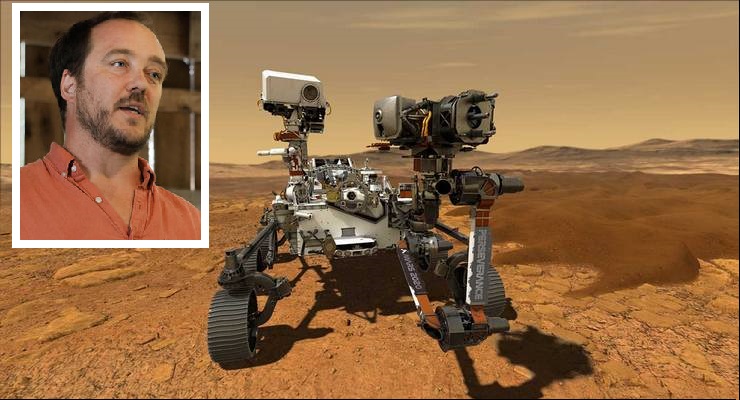
[UPDATED] As the Jet Propulsion Laboratory’s Perseverance Mars rover hurdles toward the Red Planet ahead of touching down next month as part of NASA’s Mars 2020 mission, the mission’s deputy project scientist will be sharing his thoughts about the project and what it could mean for the search for life on another world.
Ken Williford, who also serves as Director of the JPL Astrobiogeochemistry Laboratory, is scheduled to host a free online lecture Thursday through the Pasadena Public Library.
The landing of Perseverance at Jezero crater on Feb. 18 will signify “the first planetary mission since Viking with an explicit objective to seek signs of life,” the library said in a written statement. “Unlike Viking, which was concerned with seeking evidence of living or recently dead organisms, Mars 2020 will explore rocks deposited more than three billion years ago when Mars was broadly habitable and the earliest records of life on Earth were forming.”
Among a host of scientific duties, a key goal of the Perseverance rover will be to drill, store and store samples of Martian rock, which will be retrieved and brought back to Earth in a future mission for study on Earth, Williford explained. If successful, it would be the first time samples from another planet were returned to Earth.
“By analyzing those samples, we’re interested in: How did Mars evolve as a planetary system? How do terrestrial planets — that is the Rocky planet like Earth, Mars, Venus and Mercury — like ours form?” he said. “We only are able to study rocks from Earth that we carefully select, but we want to expand that field to Mars.”
The larger-scale endeavor, including the return trip, is known as Mars Sample Return, or MSR.
In the decades since astronauts first returned rocks from the Moon for analysis, “They’ve really revolutionized the way we understand the moon, obviously, but also our own planet,” according to Williford.
When it comes to the ability to detect the presence of ancient extraterrestrial life,”I think Mars Sample Return is our best near-term opportunity to potentially make that discovery,” he said.
Williford said he believed it wasn’t a matter of if life will be discovered in space, but when.
“I would say that it’s extremely likely in my view, approaching certainty, that life is widespread in the universe,” he said.
But for now, “We have zero evidence to support that, other than that habitability, that is the conditions required to support life, are almost certainly very broadly distributed in the universe.,” Williford said.
The mission has the potential to answer many important questions, as well as raise new ones to explore. And even if life, or evidence of past lift, is found, other questions would still loom, he said.
“We don’t know how many times life has emerged. I expect it’s many times,” Williford said. “Then the question is: Has that ever happened independently in our solar system, number one? Or have earth and Mars or Earth and other locations in our solar system exchanged living organisms and sort of seeded one another?”
Thursday’s lecture will be held at 5 p.m. via Zoom.
Those interested can register for the event under the “Events Calendar” section of the Pasadena Public Library’s website at cityofpasadena.net/library.
See also:
Mars 2020 and Perseverance Mars rover coverage














 0 comments
0 comments


